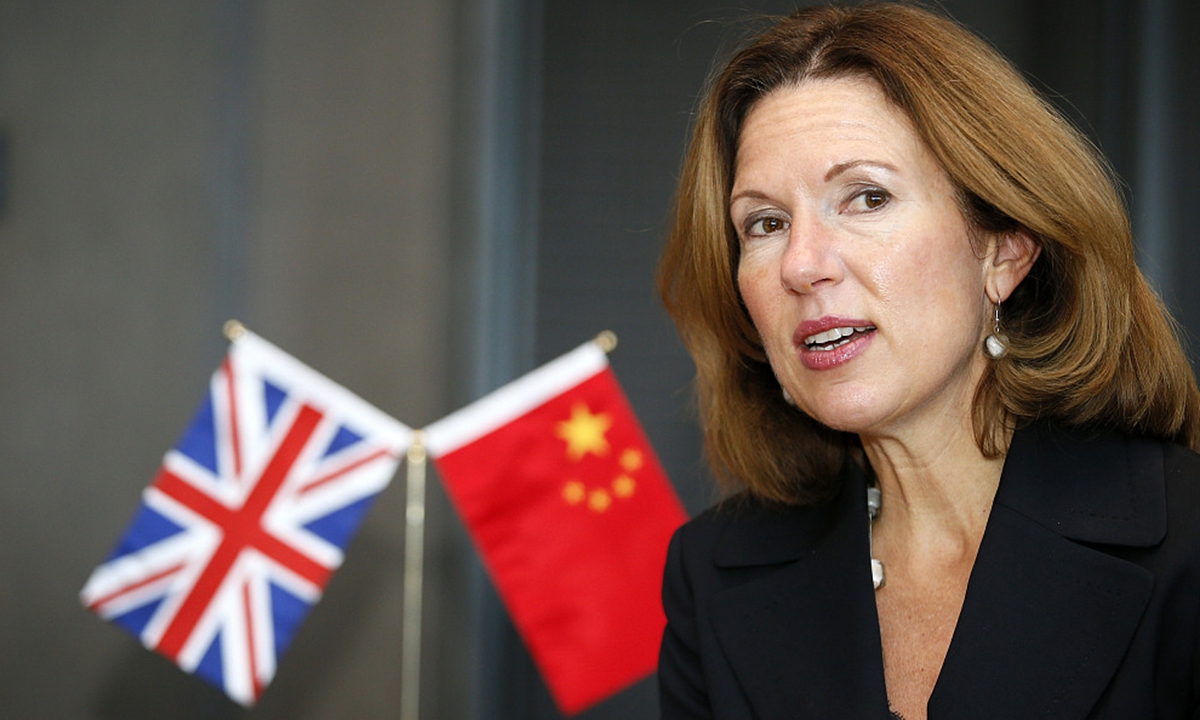
Caroline Wilson, UK ambassador to China. Photo: VCG
Caroline Wilson, UK ambassador to China, on Tuesday post an article in Putonghua (Chinese) on why international media criticism on Chinese authorities is not China hating. The article quoted my narratives on advocating China of accepting more diverse views. Yes, that's exactly what I said. Working for a media outlet, I can understand foreign correspondents' desire to have as much space as possible to engage in their coverage in China. But Wilson's rhetoric on freedom of the press is too simple, which conceals or even distorts the real relationship between media and reality.In the article, Wilson spoke highly of the role that UK media outlets play in supervising public opinion, in a bid to compare the limited role that Chinese media outlets play. China has implemented a different political system in comparison to those in the UK and the US. The role of media is a compatible part of their systems. Media of China and the West should not be simply compared in terms of technology, but on whether their media are conductive to the advancement of their societies. China has rapidly developed over the past decades. Chinese public opinion has made its contribution to the achievement. During the same period, the development of the UK and US has exposed their problems. Their media should shoulder their related responsibility to the results. It is a very complicated problem whether Chinese or the Western media serves better.
Wilson admitted that Chinese media played a big role in the initial stage of the COVID-19 outbreak, but she believed such a role is limited. My opinion differs from hers. The coverage from Chinese media on the epidemic was not as extensive as their counterparts in the UK and the US, but Chinese media's reporting have had vital effects. Chinese media's reporting, involving the internet, made the country adjust promptly and contributed to drawing up a determined road map to fight COVID-19.
By contrast, there have been many reports in the UK and the US, and some words they used are also quite harsh, but have they actually worked in practice? Trump has been giving contempt to criticism from media outlets. Where is the practical and effective supervision of public opinion? The result is that the US and the UK were bad at fighting the epidemic, and China quickly made decisive achievements in this fight. Which side - China or the West - values and respects the voice of public opinion more? Which side's practical policy is more in line with public opinion?
Personally speaking, I don't think all Western correspondents in China are "extremely anti-China." I understand that it is not easy for them to be caught between what they see in reality and the overall attitude of the West toward China. However, I would like to point out the fact that they have not played an active role in the communication between China and the West as a whole. Subjectively or objectively, they have only added fuel to the deepening of the cognitive gap between China and the West.
These foreign correspondents are in China, where many things are different from their values. However, they can and should feel the complexity of China's reality and understand that China and the Communist Party of China are not as simple as the West has labeled. China has its own internal logic, and whether the West likes it or not, this logic has supported China's development and progress. Thus, a crude and fundamental smear against it would be unfair, even absurd, in any case.
China has been pinned increasingly more labels by Western world, which shaped the West's perception of China. Intentionally or unintentionally, some Western journalists in China have been supporting such trend. I think they have at least shown collective cowardice, being afraid to explain to the West the complicated truth about the country.
Some of them are indeed hostile toward China, and are standing at the forefront of the West's envious, jealous and hateful mentality toward China's development over the years. The overall coverage of China in the Western media reports is biased and even false. Such reports shaped the huge lie that China is the "second Soviet Union" that the West has to confront. Of course, this is not entirely those journalists' fault. They are the only ones who stand at the frontline of Western public opinion on China. They are supposed to break the relevant stereotypes, but they didn't. Apart from their personal reasons, it mirrors the so-called freedom of the press in the West with political limitations which Western journalists in China cannot escape.
The system of Western public opinion is formed in the process of the evolution of Western politics. All modern media tools are invented by the West. China adopted them and has been adjusting their functions. But the adjustment is undergoing all kinds of accusations from the West. This is a difficult process, which reflects how hard it is for China to explore its own development path.
China has its own pride. We have created the miracle of rapid development, which started from falling far behind other countries. We have been observing the outside world with humility, and we will do the same in the future. The West, on the other hand, should stop taking itself as an example which China should follow. This is the basic self-respect they have to own.

